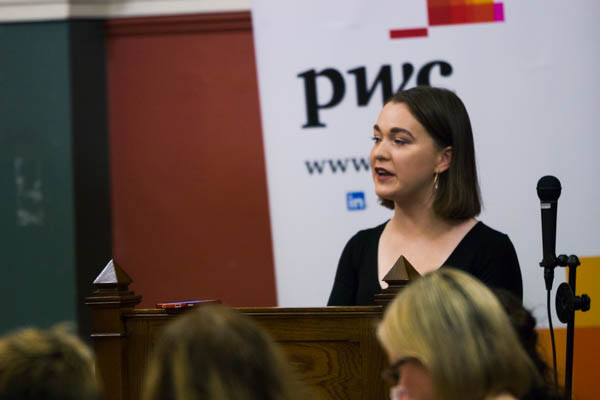The excitable, pre-debate chatter was at a louder decibel than is normal for the University Philosophical Society’s weekly debate yesterday evening. Perhaps it was in anticipation of the appearance of esteemed special guests, maybe it was the sound of start-of term eagerness. Most likely though, it was a sign of the audience’s desire to be informed as the campaign to repeal the eighth amendment rushes to a referendum next year.
Additional chairs were requested in the debating chamber, until eventually Phil council members had to close the doors. As Dublin readies itself to welcome the world’s media to it’s streets ahead of Saturday’s March for Choice, there was no better time to attend a debate on the motion “This House Believes the Repeal Campaign Should Reject Respectability”.
Sorcha Ryder was first up for the proposition in an evening of exclusively female speakers. She argued that pandering to the status quo in an effort to be seen as respectable is a waste of valuable time and resources in this campaign to achieve what she describes as a “fundamental human right”. She suggested that this is a thinly veiled attempt by the opposition to censor the movement and “dictate the confines of the conversation”. Respectable dialogue, she implored, will not sway those perched quite comfortably on the fence. If the audience’s extensive cheering and applause was anything to go by, they were certainly compelled by her arguments.
Similar themes were echoed in Katie O’Brien’s speech, when she declared that “the only way to make progress is to make noise”. Her argument that male-dominated campaigns, such as those conducted by the Irish Free State petitioners and the IRA, lacked respectability but were not chastised for it, raised eyebrows amongst the audience. However, her astute display of self-awareness in referencing that her upbringing in a “middle class South Dublin” family shielded her from fully understanding how a child could pose a financial burden regained the crowd’s attention and reinforced her plea that everyone educate themselves on the complex issue.
The matter of the repeal campaign as a class issue arose once again in Claire O’Nuallain’s speech, during which she described the “more nuanced form of inequality” that the pro-choice movement are fighting to remedy. She dismissed the concept of respectability as “arbitrary” and a tool used to “blacken our names”.
Perhaps the best-received speaker of the proposition this evening was Ailbhe Smith, Convenor of the Coalition to Repeal the Eighth Amendment and a long time advocate for women’s rights. She stilled the room by listing a series of casualties Ireland’s abortion laws have given rise to over the last several decades. “History is not a safe place for women in this country”, she declared, recalling her upbringing in a strictly conservative community, “but neither is the present for women of child-bearing age”. She insisted that while respect is a core value she holds, in regards to the Repeal the Eighth campaign, “I really have no idea if we were doing it respectably or not, and I absolutely do not care”. The audience appreciated this sentiment, and rewarded this speaker with a standing ovation.
Smith was preceded by Niamh Herbert, who opened for the opposition in a speech that was highly emotional from the outset. Flagging the fact that she herself had not fully committed to either side of argument, she shared her perspective from the position of someone with a disability. Eradication of disability from society was her main concern, stating that “I often wonder would I have lived in a world where abortion had been made legal”. She congratulated the pro-choice campaign for “successfully alienating the disabled community”. The repeal campaign, she said, lost respect a lot time ago.
Niamh Egleston too approached this motion from a highly personal perspective. Her compelling account of the evolution of her pro-choice beliefs commanded the full attention of audience members, as did her characterisation of the much-maligned Joe Soap, whose vote both sides of the debate placed particular emphasis on securing. “There has to be a way in which we tailor our message”, she implored, in order to appeal to every demographic. “This is a political campaign and must be treated as such.”
Her views were perfectly complimented by those of Róisín Ingle of the Irish Times who has become a prominent repeal campaigner. In what may have been the most lighthearted address of the evening, she highlighted the fact that the core of the pro-choice movement “is compatible with the mainstream values of love and care and compassion”. Her argument fell directly in line with Egleston’s, championing “respectability as our secret weapon”. Being polite in the face of appalling behaviour, she said, is the most effective way of guaranteeing the movement’s success.
Unquestionably the most controversial speaker of the evening was Deputy Chair of the Pro-Life Campaign, Cora Sherlock. Accusing the pro-choice campaign of having “given up on respect for life itself”, she proceeded to detail graphic depictions of termination procedures. In a statement that provoked an animated response from an otherwise respectful audience, she put forth that while the death of Savita Halappanavar was tragic, it did not occur as a result of the lack of abortion. “You may call it a shame, but it is a fact”, she argued, before challenging the crowd to “take the risk of thinking for yourselves”.
The motion was ultimately passed with a narrow majority.







